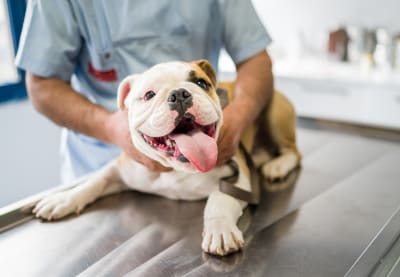Skin Cancer in Dogs
There’s one word all dog owners dread hearing, no matter the breed: “Cancer” strikes fear in the hearts of dog owners. If you’ve seen a strange lump or bump on your dog’s skin that you suspect may be cancerous, or if your vet has already diagnosed the disease in your furry companion, you are probably concerned.
Though your veterinarian should be your go-to resource for health-related questions, here are the basics about skin cancer in dogs to help you understand the condition better.
How Do Dogs Get Skin Cancer?
The most commonly diagnosed type of tumor in dogs is skin cancer. Because skin cancer is easier to see with the naked eye than some other types of tumors that may need x-rays and diagnostic equipment to identify, and partly because toxins, chemicals and solar radiation in the environment can reach skin more easily than your dog’s internal organs.
Fortunately, this also works in yours and your veterinarian’s favor - as there is a better chance for early detection, which is key to effective treatment, having a number of treatment options and long-term prognosis.
Most Common Causes
Though genetics are a significant factor in your dog’s risk of getting skin cancer, there are also other triggers including hormonal abnormalities, certain types of viruses, amount of exposure to the sun and chemicals in the environment.
Types of Skin Cancer in Dogs
Just as dogs have multiple layers of skin, they may be at risk for numerous types of skin cancer. Three of the most common types of skin cancer in dogs are:
Malignant melanomas
Typically found in the mouth or on mucous membranes (and occasionally on parts of their body covered in hair), malignant melanomas tend to grow very fast and often spread to other organs, including the liver and lungs.
Squamous cell carcinoma
Often caused by sun exposure, squamous cell carcinomas are aggressive but do not spread to surrounding lymph nodes. They can cause damage or destruction in tissue surrounding the tumor.
Mast cell tumors
These types of cancers develop in the immune system’s mast cells and are the most common skin tumors in dogs. Though causes are still up for debate, evidence has indicated genetics factor in, and hormones including progesterone and estrogen can affect development.
Signs and Symptoms
Depending on the cancer, different symptoms will appear. Generally, as your dog ages you want to carefully monitor the skin for abnormal lumps and bumps. Watch for these signs:
- Firm, raised wart-like blemishes (squamous cell carcinomas)
- Rubber-like, inflamed sores (mast cell tumors)
- Strange-colored lumps or bumps on the lips, mouth, pads of feet, toenail beds (melanomas)
- Indications that your dog is in pain, such as a limp
Beware the risk that sores or other abrasions related to cancer can be misdiagnosed as simple infections.
Treatment Options for Skin Cancer in Dogs
Treatment for your dog’s skin cancer will depend on the location and type of tumor. Depending on how far it is progressed, surgery, radiation therapy, chemotherapy and other types of therapies and drugs may be options.
Do you suspect your dog may have skin cancer? Our veterinarians can diagnose diseases and conditions and plan treatments. Book an appointment today.
Looking for a vet in Greensboro?
We're always accepting new patients, so contact our veterinary hospital today to book your pet's first appointment.
Related Articles View All
What happens during a routine pet exam?
Routine wellness exams are a proactive way to help safeguard your pet's long-term health and vitality. Why should you take your healthy pet to the vet? What happens during a pet health wellness exam? Find out.
How much does an emergency vet visit cost?
Emergency veterinary care can be costly, but planning ahead allows you to make decisions about your pet's care based on their needs rather than financial restrictions. Today, we look at the cost of emergency vet care, and how to be ready if your pet needs emergency treatment.
Kidney Failure in Dogs
Chronic and acute kidney failure are serious health problems commonly seen in dogs. Here, you will learn about the differences between chronic and acute kidney failure in dogs, the signs to watch for and how these conditions are treated.
Signs of Bladder Infections in Dogs & How They Are Treated
Many dogs suffer from bladder infections and other issues affecting the urinary tract system. What causes bladder infection in dogs? What signs should you watch for? How do vets treat bladder infections in dogs? Read on to find out.


